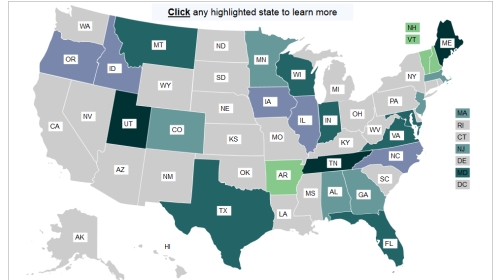
In the last few years, we’ve seen an unprecedented number of privacy battles being waged in state legislatures. Today we’re launching an interactive web map that shows the privacy laws in place across the country on four of those issues:
- law enforcement access to electronic communications content
- location tracking
- automatic license plate readers
- domestic surveillance drones
If we can address these four key issue areas, we’ll go a long way toward protecting privacy in the digital age.
Fully 24 states have laws on the books (or binding court decisions) providing at least some privacy protections in at least one of these categories. That’s up from only two states (Maine and New Hampshire) in 2012.
Of course, the devil is in the details of these laws, and some are more protective than others. At the largely inadequate end of the spectrum, there’s Texas’s drones law, which I’ve written about here. That law gets it backwards and provides insufficient protections against government abuse of drones while prohibiting private use in ways that likely violate the First Amendment. Just as bad is Tennessee’s location tracking law, which fails to protect cell phone location information obtained from the phone company (which is the vast majority of cell phone location information obtained by the government), as well as anyone who has “checked-in” on a social networking site in the 24 hours before his or her location was sought by law enforcement. Legislators in these and some other states rightly recognized the need to address privacy in the digital age, but their solutions came up short.
The clear winner for most privacy-protective state is Utah, which not only provides privacy protections against government abuse of location tracking, electronic communications content, automatic license plate readers, and drones, but also for electronic data.
But we should all be winners. If there’s any lesson from this map, it is that in every geographic region in this country—and in every color state—people are clamoring to update privacy laws to keep pace with technology. Congress should be, too. And it should start by passing the E-mail Privacy Act to provide protections for electronic communications content nationwide. If it does so, 25% of the fight (as reflected on our map) will be won—and that bill has enough co-sponsors to guarantee House passage.
In the meantime, here is our interactive state of the states privacy map. If you click on your state, you’ll find links to the actual laws or court decisions there. We encourage you to review the text or check out our blog for more information on just how protective the laws are in your state.
Stay informed
Sign up to be the first to hear about how to take action.
By completing this form, I agree to receive occasional emails per the terms of the ACLU's privacy statement.
By completing this form, I agree to receive occasional emails per the terms of the ACLU's privacy statement.


